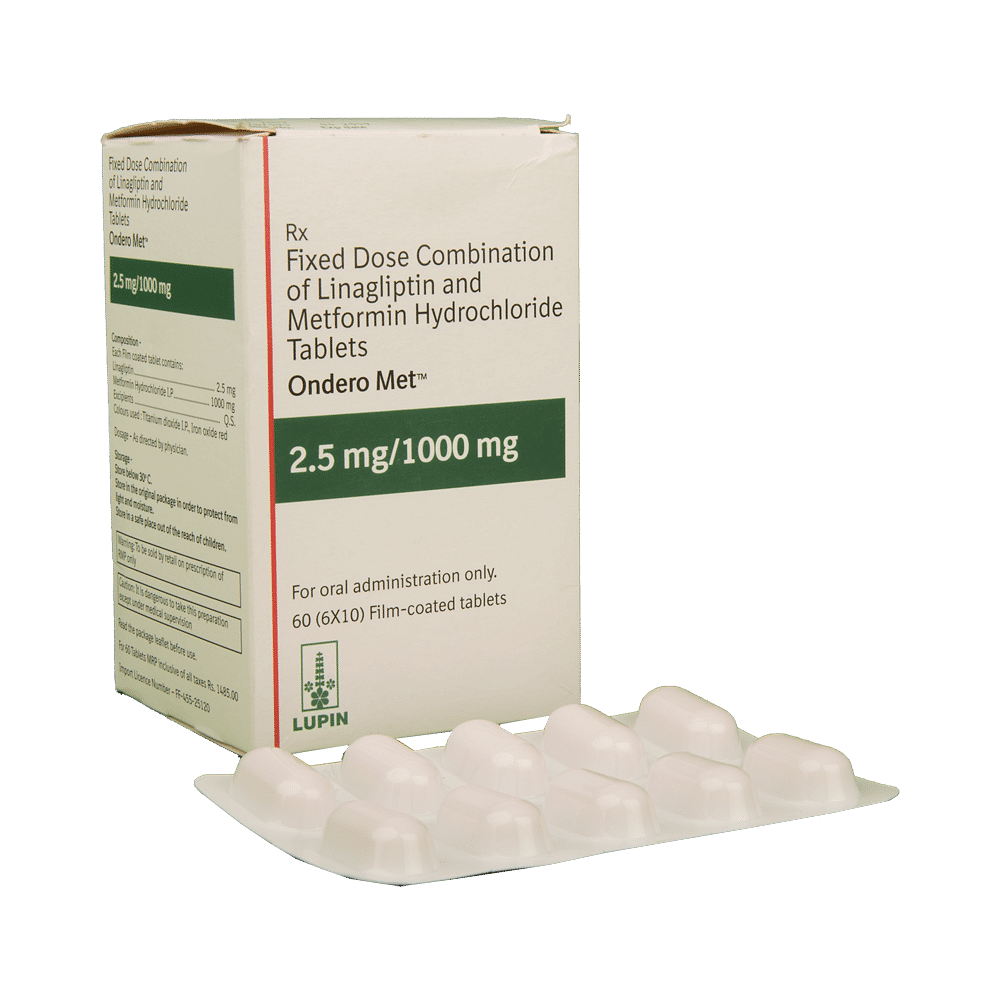
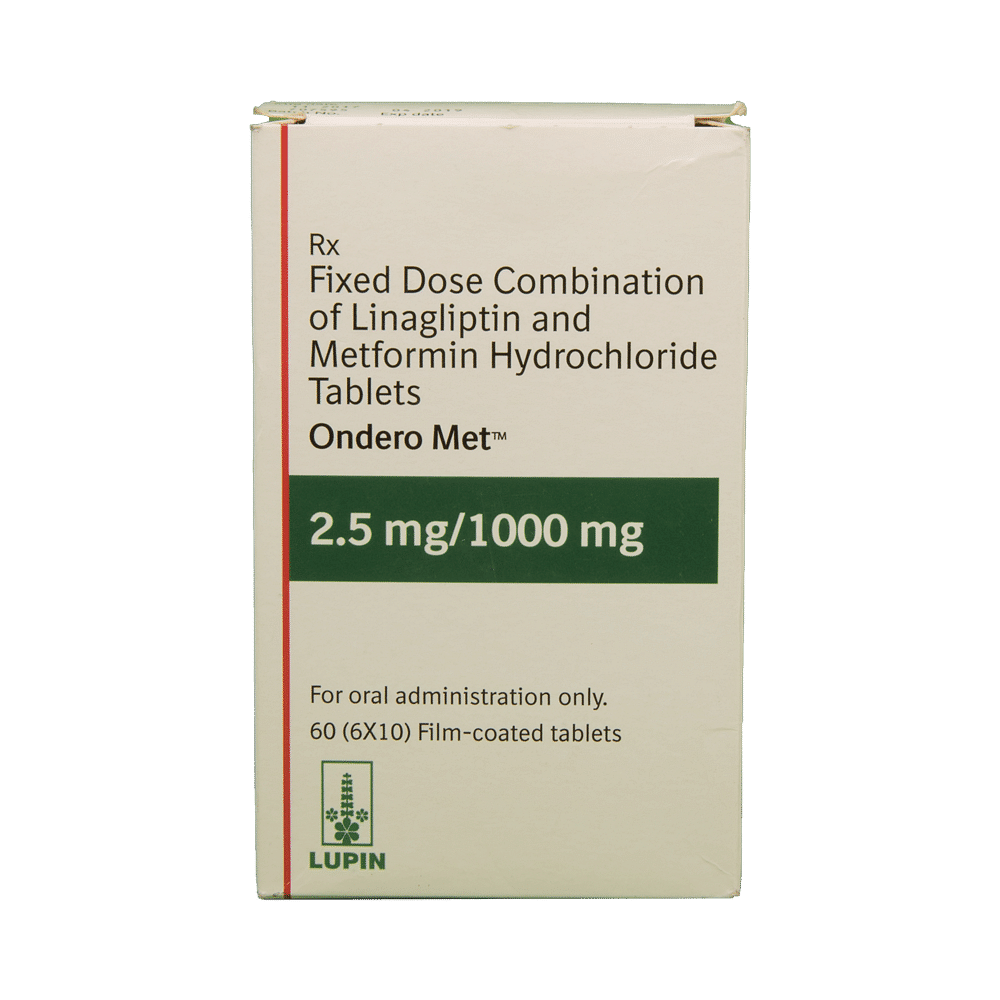
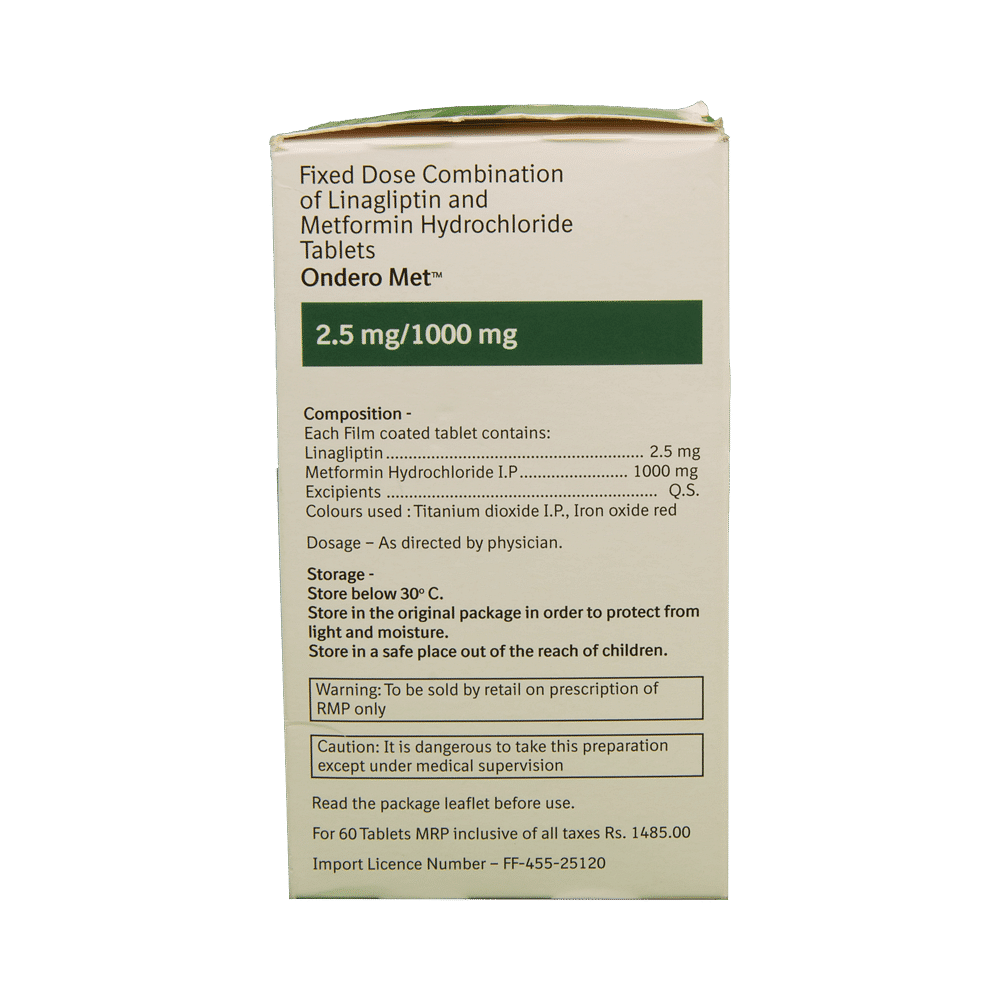
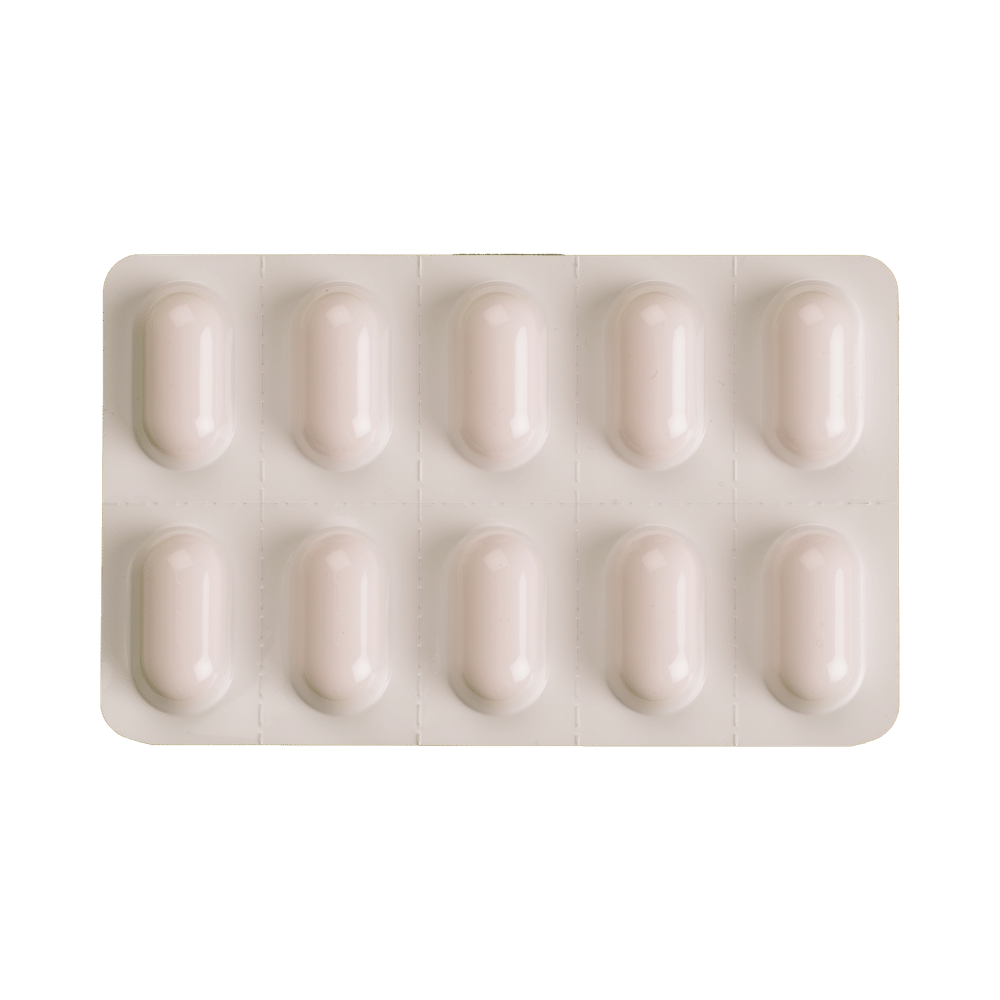
Ondero Met 2.5/1000 Tablet
Manufacturer
Lupin Ltd
Salt Composition
Metformin (1gm) + Linagliptin (2.5mg)
Key Information
Short Description
Ondero Met 2.5mg/1000mg Tablet is a combination of two medicines that control high blood sugar levels in people with type 2 diabetes mellitus.
Dosage Form
Tablet
Introduction
Ondero Met 2.5mg/1000mg Tablet is a combination of two medicines that control high blood sugar levels in people with type 2 diabetes mellitus. This helps prevent serious complications of diabetes such as kidney damage and blindness and may reduce your chance of having a heart attack or stroke.
Directions for Use
Take this medicine in the dose and duration as advised by your doctor. Swallow it as a whole. Do not chew, crush or break it. Ondero Met 2.5mg/1000mg Tablet is to be taken with food.
Safety Information
Side Effects
No common side effects listed.
Alcohol Warning
It is unsafe to consume alcohol with Ondero Met 2.5mg/1000mg Tablet.
Breastfeeding Warning
Ondero Met 2.5mg/1000mg Tablet is unsafe to use during breastfeeding. Data suggests that the drug may cause toxicity to the baby.
Pregnancy Warning
Ondero Met 2.5mg/1000mg Tablet is unsafe to use during pregnancy as there is definite evidence of risk to the developing baby. However, the doctor may rarely prescribe it in some life-threatening situations if the benefits are more than the potential risks. Please consult your doctor.
How it works
Ondero Met 2.5mg/1000mg Tablet is a combination of two antidiabetic medicines:
Quick Tips
Ondero Met 2.5mg/1000mg Tablet should be taken with food to lower the chances of having an upset stomach. Take it in addition to regular exercise and a healthy diet to lower the levels of blood sugar. Chances of weight gain and low blood sugar are lesser as compared to other diabetes medicines. Hypoglycemia (low blood sugar level) may occur when taken along with other antidiabetic medicines, alcohol or on delaying/skipping a meal. Carry a sugar source with you for immediate relief. Monitor your blood sugar level regularly while you are taking this medicine. Inform your doctor about your diabetes treatment if you are due to have any surgery under a general anaesthetic. Tell your doctor immediately if you experience any deep or rapid breathing, persistent nausea, vomiting or stomach pain as Ondero Met 2.5mg/1000mg Tablet may cause a rare but serious condition called lactic acidosis which is an excess of lactic acid in the blood.
Related Medicines

Linero M 1000 Tablet
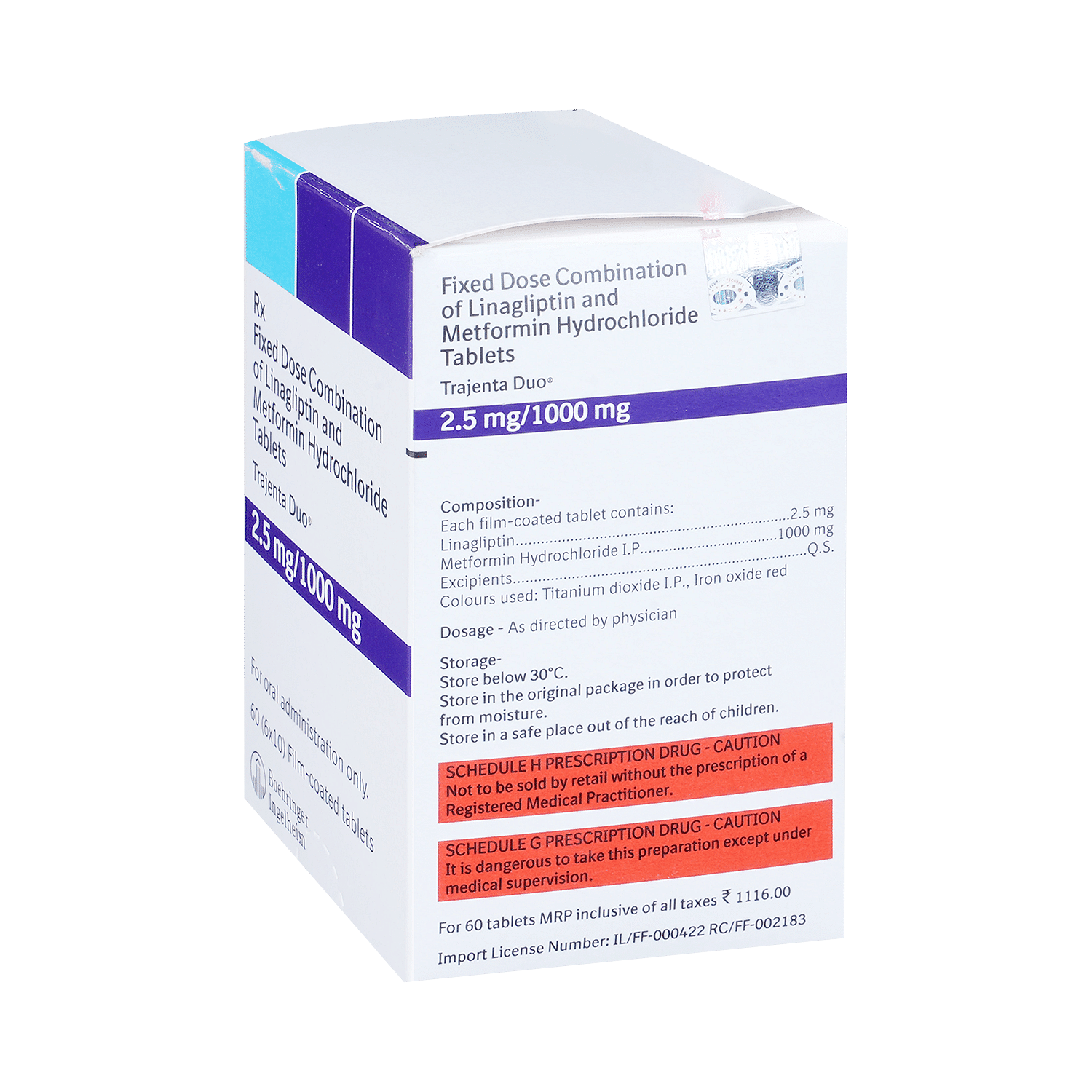
Trajenta Duo 2.5mg/1000mg Tablet

Lgpin M 1000mg/2.5mg Tablet

Lingretin M 1000mg/2.5mg Tablet

Linaget M 1000mg/2.5mg Tablet

Linabest Duo 1000mg/2.5mg Tablet

Linaxa M 2.5/1000 Tablet
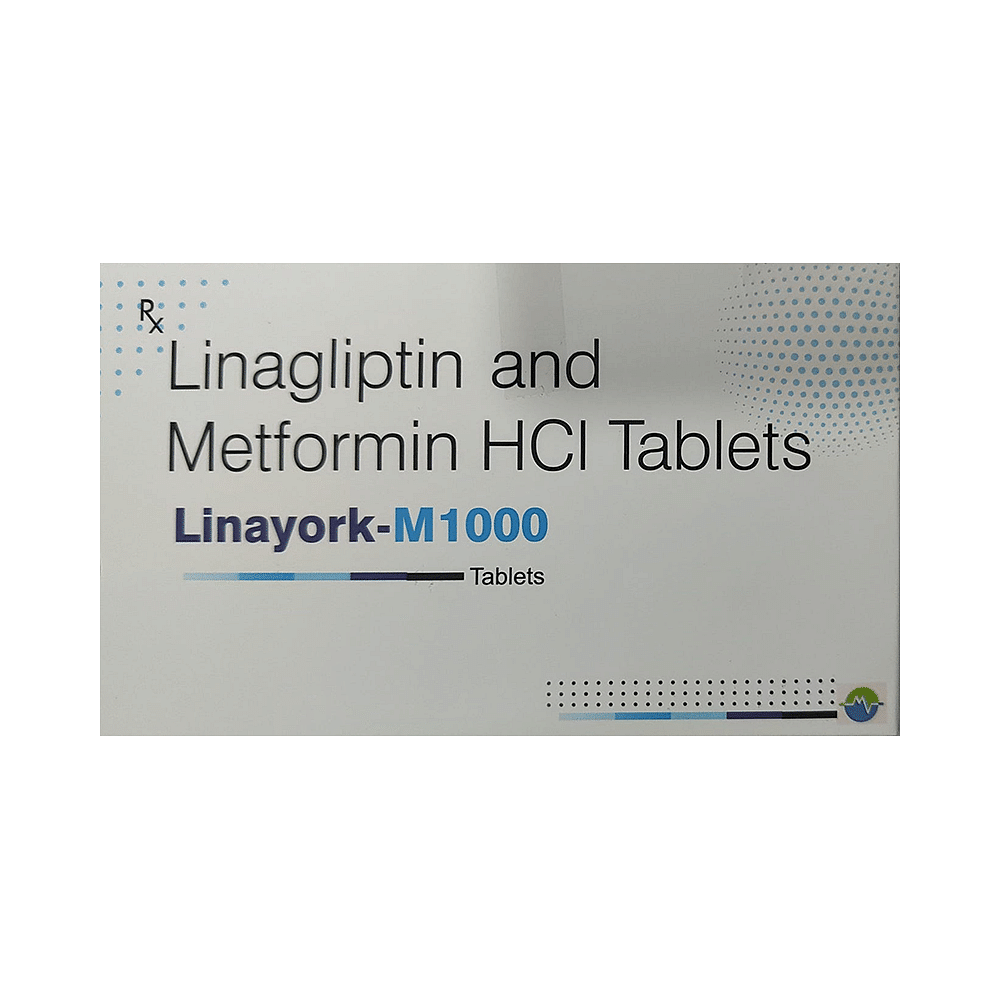
Linayork-M1000 Tablet

Linahenz M 1000mg/2.5mg Tablet

Diablin M 1000mg/2.5mg Tablet
Frequently asked questions
Does Ondero Met 2.5mg/1000mg Tablet increase the risk of lactic acidosis?
Yes, Ondero Met 2.5mg/1000mg Tablet can potentially lead to lactic acidosis, a rare side effect also known as MALA (Metformin-associated lactic acidosis). This occurs due to elevated lactic acid levels in the blood.
What are possible side effects of Ondero Met 2.5mg/1000mg Tablet?
Common side effects include hypoglycemia (low blood sugar level), altered taste, nausea, stomach pain, diarrhea, and headache. In rare cases, it can lead to a serious but infrequent side effect called lactic acidosis. Long-term use may also cause vitamin B12 deficiency.
When should Ondero Met 2.5mg/1000mg Tablet be avoided?
Before taking Ondero Met 2.5mg/1000mg Tablet, it is essential to consult your doctor if you have known allergies to its components or experience any of the following: severe kidney impairment, liver impairment, congestive heart failure, lactic acidosis, or diabetic ketoacidosis.
Is alcohol consumption safe while taking Ondero Met 2.5mg/1000mg Tablet?
No, it is not recommended to consume alcohol along with Ondero Met 2.5mg/1000mg Tablet. Doing so increases the risk of lactic acidosis, especially in fasting individuals, those with malnutrition or kidney dysfunction.
How should Ondero Met 2.5mg/1000mg Tablet be stored and disposed of?
Store this medicine in its original package, tightly closed. Follow the instructions on the label for storage conditions. Discard any unused medication appropriately, ensuring it is inaccessible to pets, children, or others.
Can Ondero Met 2.5mg/1000mg Tablet cause hypoglycemia?
Ondero Met 2.5mg/1000mg Tablet typically does not directly cause hypoglycemia (low blood sugar level). However, insufficient calorie intake while using it may result in hypoglycemia. Symptoms include nausea, headaches, irritability, hunger, sweating, dizziness, rapid heart rate, and feeling anxious or shaky. If these symptoms occur, monitor your blood sugar levels regularly.
Does Ondero Met 2.5mg/1000mg Tablet lead to vitamin B12 deficiency?
Yes, long-term use of Ondero Met 2.5mg/1000mg Tablet may cause a decrease in vitamin B12 levels due to its interference with stomach absorption. This can result in anemia and nerve problems. These symptoms include tingling or numbness in hands and feet, weakness, urinary issues, altered mental status, and difficulty maintaining balance (ataxia). Consult your doctor if you experience these symptoms.


